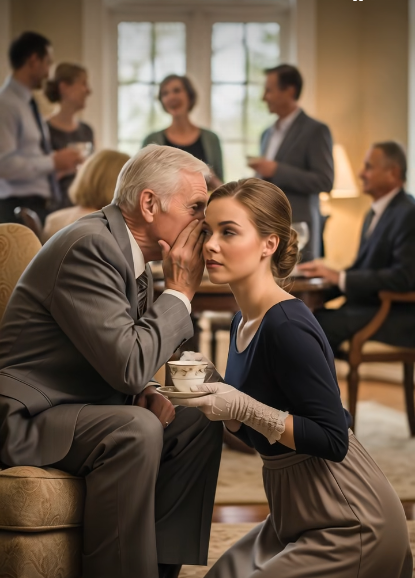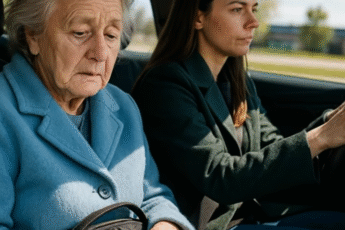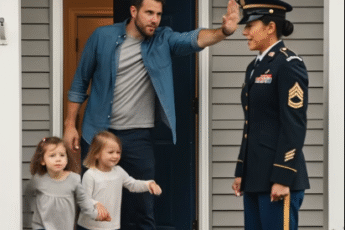The digital clock on my dashboard read 4:45 p.m. as I pulled up to the Avery house, the engine ticking in the damp October air. The cul-de-sac was so unnervingly still I could hear a neighbor’s wind chime counting down the seconds to a confrontation I didn’t know was coming. One hand gripped the grocery store birthday cake on the passenger seat; the other, a card I’d rewritten three times, unsure of the right words for a man who used to call me “kiddo” before a stroke had stolen his voice and shoved him into a wheelchair.
I told myself they were just late. Traffic from the city, perhaps. But deep down, I knew better. Lateness wasn’t their style. Avoidance was.
I let myself in with the key Charles, my father-in-law, had insisted I keep. The foyer smelled of bleach and the cloying lemon candles my mother-in-law, Lauren, favored. There were no banners, no balloons, no chorus of “Surprise!” The silence was a presence, broken only by the hum of the refrigerator.
A year ago, I’d watched Charles laugh so hard sweet tea came out of his nose while my husband, Avery, teased me about my long shifts as a nursing assistant. “She keeps the world turning while people like us just talk,” Charles had said, winking at me. It was the last full laugh I’d heard from him before the stroke silenced him. Since then, Avery’s teasing had curdled into scorn, and Lauren’s polite smiles had become as thin and sharp as ice. Only Charles, through pained gestures and labored writing, still asked if I was okay, if the night terrors after the miscarriage had eased.
I carried the cake toward the kitchen and stopped dead. On the butcher block island sat a single, sad slice of pepperoni pizza on a crumpled paper towel. The grease had congealed into waxy, orange pools. Beside it, Charles sat in his wheelchair, a thin blanket pulled over his legs, his shoulders slumped in defeat. The television was off. The room was dim. His eyes met mine, and in them, I saw a universe of shame and a question he was too proud to ask.
“Hi, Dad,” I whispered, the words echoing on the cold tile.
Before I could even find a plate for the cake, the cheerful chime of a FaceTime call cut through the silence. Avery. I answered.
The screen exploded with a Hawaiian sunset, all fiery reds and impossible golds. Avery lounged against a tiki bar, a neon-blue drink in his hand. Lauren leaned into the frame, a hibiscus tucked behind her ear, her face flushed with sun and alcohol.
“Oh, good,” she sang, her voice slurring slightly. “The nurse showed up.”
Avery smirked into the camera. “Hope you’re enjoying babysitting the cripple. We figured he wouldn’t even notice we were gone.”
Lauren clinked her glass against his. “He probably doesn’t even know it’s his birthday. Just keep him upright, Marina. Try not to break anything.”
I stared at them, at their casual cruelty, their thoughtless laughter spilling through the speaker from thousands of miles away. “You left him alone,” I said, my voice a hollow whisper.
“He’s got you,” Avery shrugged. “Besides, Hawaii was on sale.”
Something inside me didn’t just crack; it tore. I ended the call and placed the phone face down on the counter. My hands were sweating. I looked at the cold slice of pizza, a pathetic monument to their neglect.
A squeak of rubber wheels on tile. I turned. Charles’s blanket had slid to the floor. One foot, then the other, planted firmly on the ground. The muscles in his calves, long dormant, twitched with effort. He gripped the armrests of his wheelchair, his eyes locked on mine, a silent plea for secrecy, a dare for me to speak.
Inch by deliberate, agonizing inch, he pushed himself upward. He wobbled, a frail ship in a storm, but he did not fall. My breath caught in my throat. The man the doctors had written off as immobile, the man his family had dismissed as a piece of furniture, stood before me.
“You… you can walk,” I sputtered, my mind struggling to reconcile the sight with a year of medical reports and mournful sighs.
He lowered himself back into the chair with painstaking care. “‘Walk’ is generous,” he muttered, his voice raspy from disuse. “‘Shuffle’ is closer. But it’s enough.” His gaze darted to the hallway, ensuring our secret was still safe.
I knelt beside him. “How long?”
“Since summer,” he confessed. “Started with ten seconds at a time when they were out shopping. Added five seconds a week.” A ghost of a smile touched his lips. “I kept the hand tremor on purpose. It makes them underestimate me.”
My mind raced through the past few months: Lauren insisting Charles needed stronger sedatives because he was “agitated”; Avery clearing out the guest room for his home gym because “Dad will never use it.” They hadn’t just been neglectful; they had been actively profiting from his perceived helplessness, milking his condition for sympathy from friends and credit card points from travel agencies.
He leaned forward, his voice a low, urgent whisper. “If they knew I could stand, they’d have me in a nursing home before dawn. It’s easier to control the money when the old man is tucked away.”
The betrayal should have tasted bitter, but all I felt was a cold, clarifying focus. “They used both of us,” I whispered, the realization hitting me with the force of a physical blow. After my miscarriage, Lauren had patted my shoulder and said, “Some women just aren’t built for motherhood.” Avery had booked a golf trip two states away instead of staying with me. Only Charles had texted at 2 a.m., his words slow and misspelled but full of a father’s love: Proud of you, kiddo.
He reached for a nearby bookcase and pressed a concealed latch. A hidden drawer slid open, revealing a bulging accordion folder and a single flash drive.
“I recorded everything,” he said, his voice hard as iron. “Hidden cameras. A baby monitor in my room. I have their phone calls, their meetings with lawyers. I have Avery bragging about changing my IRA beneficiary while sipping my best scotch.” He looked at me, his eyes piercing. “Why am I showing you this?”
“Because you still show up,” he answered his own question. “And because kindness without a backbone gets trampled. I’ve asked for your silence for too long.”
The folder was a bombshell. Bank statements, medical charts with discontinued medications circled in red, notarized letters revoking Lauren’s power of attorney that they’d never even noticed. My pulse throbbed in my ears. The years of swallowing insults, of telling myself to keep the peace, collapsed in an instant.
“Then let’s give them a birthday gift they’ll never forget,” I said, my voice steady.
He managed a rusty chuckle, a sound I thought I’d never hear again. “That’s my girl.”
The grandfather clock chimed seven. I helped him settle, locked the secret drawer, and picked up my phone. Three new texts from Avery. Where’d you put Dad’s meds? A photo of the cake with the caption: Good. Send a pic of the old man for the gram, babe. I powered it off.
Halfway home, a voicemail notification flashed on my dashboard. Avery, his voice tight with suspicion. I ignored it. I was no longer the caretaker of their secrets. I was part of the storm that was about to break.
By 6 a.m. the next morning, I was back on the highway, the pink dawn reflecting off my windshield. Charles was waiting in the doorway, his posture straighter than any physical therapist would have believed possible. “We’ll need a step stool,” was all he said.
In the garage, he guided me to a false panel in the ceiling. A metal lockbox thudded into my hands. Inside: three palm-sized cameras and an external hard drive. “They forgot one thing,” Charles murmured. “I was trained to document enemy movement.”
In his dusty basement office, we loaded the files. The screen filled with time-stamped clips. Lauren’s voice crackled through the tiny speakers: “If he drops dead before July, I swear I’ll take a cruise in his honor.” Avery, leaning over the wheelchair: “Stay alive till the refinance clears, old man. After that, no promises.” Clip after clip of their casual cruelty, their greed, their utter disdain for the man who had given them everything. And then, one from just two nights before: Avery bragging to Lauren about canceling the debit card he’d given me for household expenses, the one I used to buy his father’s groceries and prescriptions. “She’s useful,” he’d said, “but once we move him to Meadowbrook, we ghost her. Simple.”
I froze, my hands clenched into fists. I hadn’t just been a caretaker; I had been an unwitting financier of their parasitic lifestyle.
“They strip us piece by piece,” Charles said, his voice dangerously low. “First dignity, then money, finally memory.”
He handed me a ring of tarnished keys. “There’s more. Upstairs.”
The attic smelled of cedar and time. A dented filing cabinet crouched in the corner. The middle drawer groaned open to reveal a folder labeled: Amendment. Beneficiary Change. My hands trembled as I opened it. It was a fully executed legal document, signed and notarized six months prior. My name, Marina Avery, was listed as the sole caretaker and executrix of the estate.
A single, folded sheet of yellowed paper fell into my lap. If you’re reading this, it means I still trust you. If anything happens to me, this document is your light. Show it to them. Let them choke on the truth.
I hugged the folder to my chest. This wasn’t just a case. It was a reckoning.
That evening, the landline rang. Avery. I put it on speaker.
“Hey there, birthday boy,” his voice slurred through the line. “How’s the party? You and the maid cut the cake yet?” In the background, Lauren cackled.
Charles leaned forward, his voice clear and sharp. “Hello, son.”
The line went dead quiet.
“Dad?” Avery’s voice dropped, suddenly sober. “You’re… talking.”
“Yes,” Charles said, his tone like ice. “We have a lot to talk about. Starting with your inheritance. Or rather, the lack thereof.”
A rustle, then Lauren’s shrill voice. “This is manipulation! Marina’s brainwashing you!”
I stepped in, my voice calm and precise. “Actually, Lauren, I’m executing the responsibilities given to me under a legally binding durable power of attorney, signed by Charles six months ago. The attorney of record is Mr. Jacob Halpern. I believe you’ve met.”
The silence on the other end was a confession.
“According to Charles’s amended will,” I continued, “I am the sole successor trustee.”
“This is absurd!” Lauren shrieked. “We’ve already started clearing out the house in Big Bear!”
Their arrogance had just admitted to theft from an irrevocable trust, on a recorded line.
“I hope you realize that’s a criminal offense,” I said, my voice still level.
“You can’t prove anything!” she spat.
Charles chuckled, a low, dry sound. “Everything you’ve touched can be traced. You thought you were untouchable because you laughed while I was in a wheelchair?”
“What do you want?” Avery’s voice was shaky now.
“I want,” Charles said, leaning back in his chair, “to see what happens when the forgotten become the powerful.”
I reached forward and calmly ended the call. The silence in the room was louder than any of their shouting. I looked at the phone, then at Charles. “See you in court,” I said quietly, a promise to him, and to myself.





